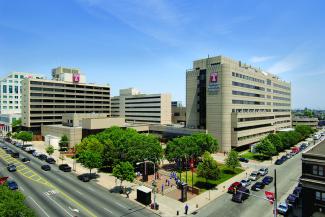Though childbirth is a natural process, it still may require medical intervention — anything from minor medications to help the mother feel more comfortable to major interventions to protect the life of the mother and baby. Labor and delivery services at Temple Health aim to help each woman deliver her baby in a compassionate environment, while providing prompt, skilled medical services, including Caesarean section, when needed.
Active labor is typically described as 3 stages:
- Early stage — the cervix opens fully
- “Pushing” stage — the baby is delivered
- Final stage — the placenta is expelled
Each stage is generally shorter than the previous, but times vary wildly; one woman may complete labor and delivery in a very short amount of time, while another may spend more than 24 hours in the first stage alone.
When Medical Intervention May Be Necessary
Several difficulties that warrant medical intervention may occur during labor and delivery. Among the most common of these are:
- Labor pains. Many women may experience intense pain during labor and delivery, and appreciate holistic or medical pain management.
- Problems with the umbilical cord. This cord that delivers oxygen and nutrients from the mother to the baby may be wrapped around the baby’s neck, for example.
- Positioning concerns. Typically, babies emerge head-down. When they’re turned head-up or lengthwise, known as breach position, they may be harder to deliver.
- Placental problems. Sometimes, the placenta may cover the cervix, causing severe bleeding during delivery.
- Maternal health concerns. Conditions such as high blood pressure, diabetes and other diseases may make delivery more difficult for the mother.
- Multiple babies. Twins, triplets or larger numbers of infants may be more difficult to deliver safely.
Treatment Options
Treatment for labor and delivery may be quite hands-off or highly interventional, depending on the situation. In any event, it’s important to keep close watch on the health of mother and baby. This can be done via external or internal monitors. Depending on how the labor is progressing, the mother may only need supportive coaching, or she may require pain medication, Cesarean section, or other medical assistance.
- Labor support and coaching help many women navigate childbirth successfully. The woman may learn breathing strategies, find effective labor positions or incorporate holistic practices such as guided imagery or hypnosis to manage pain and deliver efficiently.
- Many women find medical pain relief extremely beneficial during labor. Pain relief may include injections of medications or nerve blocks. Many women request an epidural, in which pain medication is delivered via catheter into the lower back, numbing the lower portion of the body.
- Labor induction is sometimes necessary when a baby is past term and the mother hasn’t gone into labor, or because of other medical complications. The doctor may administer the drug pitocin via intravenous line to initiate labor.
- Cesarean section, or surgical delivery of the baby, may be necessary when labor fails to progress, when the mother or baby is in distress, or when there are multiple babies. Also known as C-section, this procedure usually takes place under partial anesthesia, though sometimes general anesthesia is used. The doctor makes an opening in the mother’s abdomen and uterus and delivers the baby, then uses sutures to repair the uterus and abdominal wall. This procedure usually requires about 4 days’ stay in hospital for recovery.
- Other emergency treatments may be necessary during labor and delivery. Some women receive blood transfusions if they’ve experienced hemorrhaging, or excessive bleeding, after delivery.
Support for Mom & Baby
Temple Maternity Care offers a broad spectrum of labor and delivery care. Board-certified obstetricians, nurse midwives, nurses and physician assistants on staff work with each woman to make sure her birth experience is as rewarding as possible. Temple offers round-the-clock access to advanced medical technologies, from anesthesiology services to maternal-fetal medicine for high-risk births. After delivery, women are provided with plenty of bonding time, as well as specialized lactation coaching and extra training in washing, dressing and otherwise caring for the new baby.
Over 20 physicians make up the medical team of OB/GYN & Reproductive Endocrinology at Temple Health. Board-certified and fellowship-trained, these physicians are well-qualified to oversee the most difficult births. Their compassionate manner has earned many of them spots on Castle Connelly’s Top Doctors lists, as well as other local awards. Many perform research into obtaining the best outcomes for high-risk pregnancies.
Whatever issues faced by the mother and baby, Temple is a destination spot for patients in the Philadelphia area.
Ready for an Appointment?
Find a doctor near you, request an appointment, or call 800-TEMPLE-MED (800-836-7536) today.
